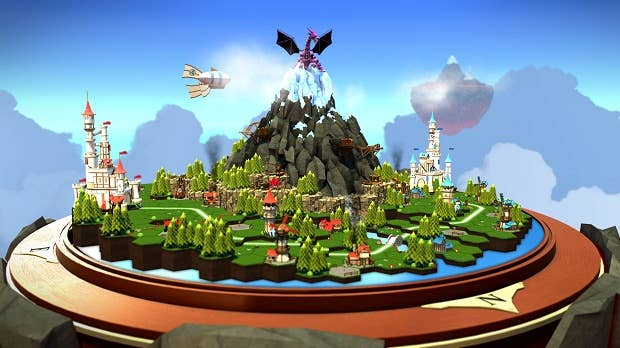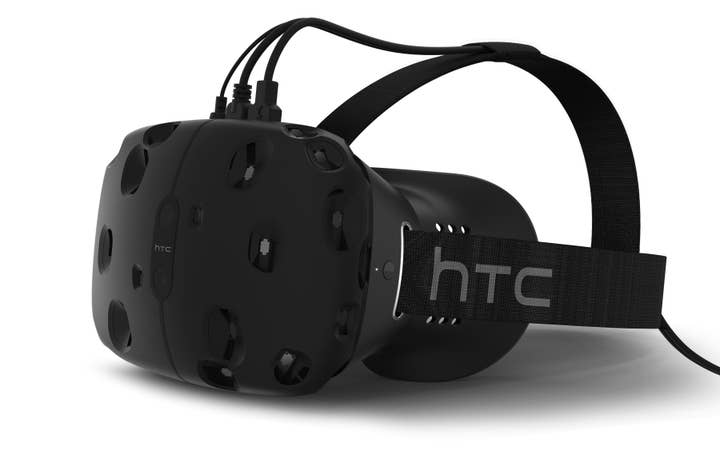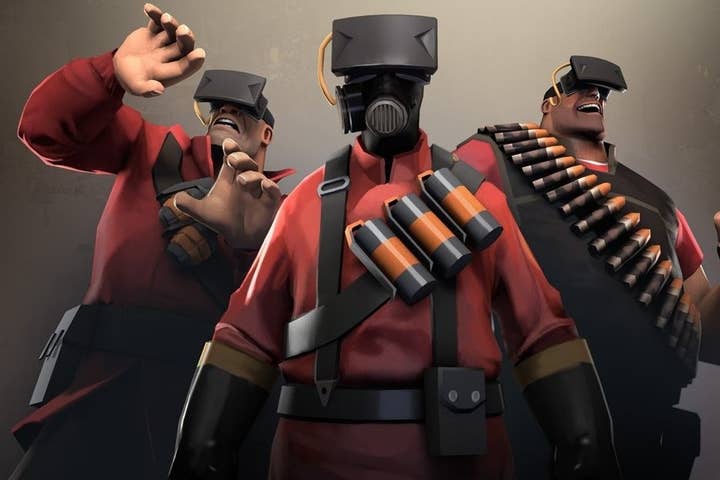Valve won GDC
In a year all about virtual reality, Valve and HTC's Vive stole the show
People left GDC in one of two states, either raving about Valve's Vive virtual reality demonstration or raving that they weren't able to get in to see Valve's Vive virtual reality demonstration.
The usual VR demonstration goes something like this: you're guided into a small room, a very nervous public relations type tries their best to place the headset on you without ever actually touching you, and then shouts like a nervous new mum at the beach every time you take more than a step in any single direction.
With Valve I was shown two sensors, placed on strategically located bookcases in the demo cubicle, which would create a 15-foot by 15-foot space on the floor I could move around in. The headset was placed on me, a weight was tied around my waist to balance the wires and headset (doing a Gwyneth and eating only avocado flavoured air before the show must have really paid off) and a controller was placed in each hand. Roll demo.
And then my brain exploded. You know when you first try to talk to civilians about VR and they say "like Star Trek?" Well this is like Star Trek. This is the full Wesley Crusher. First of all, the sense of freedom (despite the cables trailing behind you like a tail) is totally new, even in such a small square, and yet you feel safe because if you reach the boundary a grid flashes up to warn you that you're not IRL.
Then, I have to talk about the controllers, which looked and felt like a more complicated and pressure sensitive version of the PlayStation Move. No matter what I was doing--picking items up, using handles, painting--they felt intuitive and natural. Immediately I knew what I had to do when I was opening a fridge (to get the eggs to make a sandwich for a robot) or picking up tools or painting 3D images with oil paints and rainbows.
And it was this interactivity, the potential of the controls and the showcase demos that Valve had put together that really showed me, and everyone I spoke to at the show, that VR could offer more than a beautiful world to stare at passively. More than a shooting gallery. One friend was genuinely moved by the potential for creative play with his children, another saw a massive return for tabletop gaming thanks to projects like Skyworld.

Oculus VR's Crescent Bay proved to me that VR could be immersive, it was what turned me from a skeptic to an evangelist. Their acquisition of Nimble's hand tracking tech has huge potential for controller-free experiences. What leaves Oculus just behind Valve right now is its focus on technology not content, a smart move for a company owned by a social network rather than one focused on games, perhaps, but a move that has left even the biggest virtual reality fan hungry for a proof on concept. And Valve made it with Portal robots; I mean, well played.
"You know when you first try to talk to civilians about VR and they say 'like Star Trek?' Well this is like Star Trek"
I've no doubt that the VR device with the biggest commercial potential is Sony PlayStation's Morpheus; its plug-and-play nature and Sony's marketing capacity means it will be on everything from soccer sidelines to Christmas commercials. Sony will be the smartest about showing it off to consumers too; expect pop-up shops and demo stations anywhere there might be gamers. The content they showed was also ahead of Oculus on interactivity, there was shooting with a Guy Ritchie-style gangster scenario: hiding behind a desk, popping out to shoot enemies using the Move, searching drawers for more ammo. There was a doll's house full of PlayStation's tiny Playroom robots that reacted when you looked at them... or they were meant to. What actually happened was I stared at them while a developer shouted at me to move my head left, down, up, down again, and the robots ignored me. I tried not to take it personally.
The truth is not everyone has a home suitable for a virtual reality room and not everyone can enjoy the exquisite agony that is PC gaming, drivers, software conflicts, and video cards that will happily play Assassin's Creed: Unity, but a $4 puzzle game that would run on a calculator is suddenly an issue. For most people, a PC that is for more than Facebook and Microsoft Word is still a terrifying technical challenge. That huge portion of gamers is where Sony will sweep up.
But it's still Valve that have put out the strongest showing, cleverly letting everyone else whisper about their "virtual room" before they decided to let media try it. Waiting until they had the perfect experiences to show just what that tech could do. Oculus VR was the medium's champion, Sony will be its break into the mainstream, but Valve just might be its leader.



